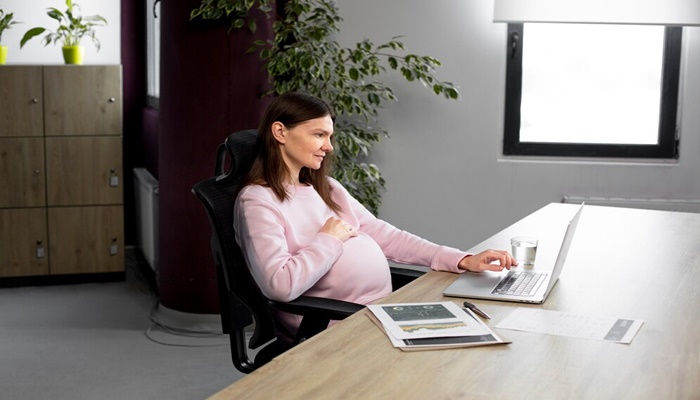One of the nice things about being an adult is we generally don’t need to ask anyone’s permission to go to the bathroom. It’s a basic necessity that we take for granted.
A woman recently turned to Reddit’s legal advice subreddit with a disturbing question: Can her employer fire her for needing more bathroom breaks while pregnant?
She’s pregnant, works in a call center, and the company has threatened her with termination if she takes more than 10 minutes’ worth of bathroom breaks in a shift. She wrote:
I’m pregnant (with complications) and currently employed by a large credit union in Colorado. I requested additional bathroom breaks as a reasonable accommodation, supported by a very clear and detailed letter from my doctor explaining why it’s medically necessary. Everything my request, their response, and the medical documentation is in writing.
I work in a call center environment (sometimes remote), and all my bathroom breaks are tracked through a dialer system, so there’s a record of how often I’m stepping away. Generally if I go over 10 minutes of bathroom break total, in a day, I am faced with disciplinary action. I was clear that these more frequent bathroom breaks wouldn’t be more than a few minutes each. Despite this, they denied my request, claiming it would cause “undue hardship” to provide the bathroom breaks as needed on an hourly basis or every other hour.
They’ve now told me that if I don’t agree to return to work without the accommodation, they’ll no longer consider me employed essentially threatening to fire me unless I accept working under conditions that could seriously impact my health.
If you have a pregnant woman at work asking for an accommodation, threating termiation is a bad way to start. If you’re denying a pregnant woman extra bathroom breaks, you’re in even bigger trouble.
Pregnant women’s rights at work
It should be clear that everyone should have the right to use the bathroom when needed, but under the Pregnant Worker’s Fairness Act (PWFA), extra bathroom breaks are a must.
The PWFA covers a wide range of female reproductive needs, but at its heart is a simple idea: employers must grant pregnant employees “simple, inexpensive, commonly sought accommodations,” such as, according the the EEOC’s guidelines:
- Additional, longer, or more flexible breaks to drink water, eat, rest, or use the restroom
- Changing food or drink policies to allow for a water bottle or food
- Changing equipment, devices, or workstations, such as providing a stool to sit on, or a way to do work while standing
Note that the first thing has to do with bathroom breaks. This is not a list I came up with—it is a list from the EEOC itself. Any company with 15 or more employees (the minimum number for the PWFA to be in effect) is going to be hard-pressed to prove that extra bathroom breaks are unreasonable.
A one-way ticket to a lawsuit
The PWFA requires more than just accommodations from the above list. As they must with the Americans With Disabilities Act (ADA), employers must go through an interactive process to come to a solution. Employers cannot just reflexively say no.
In a case like this, however, it is a straightforward answer. Employment attorney Jon Hyman said, in regards to this Reddit post: “It’s an easy accommodation, little hardship, and, quite frankly, just the right thing to do. Just ask any woman who’s been pregnant (I’ve been told). To me, denying the accommodation is a one-way ticket to a lawsuit.”
Getting dragged into a lawsuit over bathroom breaks is a lose-lose. It’ll cost you time, money, and the respect of your team.
You don’t need a law to do the right thing
The PWFA is a new law, but even prior to this, denying a pregnant woman extra bathroom breaks would be the wrong thing to do. First of all, OSHA requires that employees have access to bathroom facilities when they need them. Secondly, people need to use the bathroom and pregnant women need to go more during all stages of pregnancy. Normal humans recognize that and accommodate for that usage.
Your employees will see how you treat other employees. If you want to have a good workplace environment, you can’t treat people like toddlers, you documenting all their bathroom breaks and interrogating them if they take four when you think they should only take two.
Certainly, if an employee is going to the bathroom to spend 20 minutes on their phone, you do not have to allow that. But that’s not a bathroom issue. That’s a work issue and you would work with the employee just as you would any employee who has excessive time away from their desk.
Bathroom usage isn’t consistent for every person. There are many reasons why one person may have more need than another and why someone’s usage may increase for a time. You should work with employees to make sure their physical health is taken care of.
If it becomes excessive, you can ask the employee to get a doctor’s note and, if appropriate, go through the interactive process under ADA to find a solution. If the employee is pregnant, remember that accommodations should be granted if they are simple, inexpensive, and commonly sought. And as any woman who has ever had a baby will tell you, frequent bathroom breaks are commonly sought.
You shouldn’t need a law to treat people decently—but now there is one. The PWFA makes it clear: If an employee is pregnant, reasonable accommodations like extra bathroom breaks aren’t optional.
But beyond compliance, how you handle these moments defines your workplace culture. Choose compassion. Choose common sense.






















